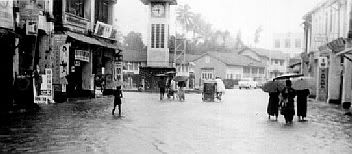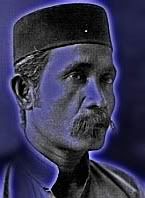To be called ubi török is to be consigned to the bottom of the heap because
ubi török is Trengganu rhyming slang for
cörök, bottom of the class, a dunce with a double 'd'. Of the things that are taken into account,
cörök is the last of all.

This is a good time to be talking about
ubi, in this
piang böh, the season of the floods.
Piang is an almost forgotten Trengganu word (and perhaps Kelantanese too;
piyæ?). It began most certainly from
piantan, which Winstedt in his unabridged Malay-English defines as 'auspicious', but it is also used euphemistically to mean 'usual time'. So
piantang böh, the usual time for floods, would have come to Trengganu in a very convoluted way, from
piangtang to
piang, and so on to
piang buöh, piang duku and
piang piala muséng jo'ong...the fruit season, the duku season, and the Monsoon Cup and a heigh nonnie-no.
And there's something there that we may have forgotten too. The fruit season wasn't just known as
piang buöh but as
piang buöh kayu, season of the fruit of the trees. Rainy day women with rainy day fruits, in baskets that are carried from boats to markets on the river-banks or at the intersection of roads in Chabang Tiga, or in the bay area in Tanjong in Kuala Trengganu.
Although the
ubi is not, strictly speaking a fruit, it comes with the monsoon crop from the forest trees, and it holds a special place in wet weather. There is something comforting about the tapioca arriving steaming hot on a plate while the day rages with the monsoonal shower, or the large tubers that rise from beneath the earth and sitting oven-ready on the newsprint laid out in the
pasar. One theory about the
ubi's rise with the downpour is that in this season of wind and floods, the
ubi have to be dug out before they are damaged by the water.
Chuck a tapioca into the fire, roll a sweet potato in there too -
ubi kayu and
ubi setela - but some of the bigger
ubi are meant to stew in the water, muttering incessantly and spitting in the air as the liquid boils and pushes the salt through the
ubi's pores. There was the
ubi ppayang that got its name probably from its girth, bulging beneath its skin like the earthen jar or the
ppayang as we call it in Trengganu. Tenderised by the heat and moistened in the boil, a slice of this
ubi takes the look and feel of your
nasi kapit or compressed rice that travels well into the peanut sauce with the
satay. I'm not sure if this is the same
ubi that some folk call the
ubi nasi.
The are many more
ubi than rise above the soil, little dark ones like
ubi kemili whose name in the local lingo is too rude to mention now. Then there's the hefty
ubi gajah, the elephant in the room of the
ubi world. The
keladi is an
ubi too, mushier in its outer layer when taken fresh from the boil and fuller in taste on a gloomy day when cats drop and dogs hurl from the sky.
Ubi is the primordial food, a basic comforter, and a crop always in deep storage whenever the hunter gatherer goes out on the prowl.
That probably explains the
ubi's lure. What better to embrace on a cold day than the steaming carbohydrate, dipped in sugar. For the mellower taste, the preferred dip is
nyiur, the pristine coconut, shredded and salted. But there are others who prefer to dip it into
nnisang, our coconut sugar.
Ubi and its accompaniment, on the
selasör, the rain can pour for weeks on end and the wind may blow, but the yam and the sweet potato, the tapioca and those myriad others, this is seasonal food, much like turkey on Christmas day.
Photo credit: I have stolen the picture of keladi (yam) [above] from
Pak Zawi's wonderful blog. Thank you Pak Zawi!
Labels: böh, cörök, keladi, piang, piantan, tapioca, Ubi from Pak Zawi, ubi gajah, ubi kayu, ubi kemili, ubi török




